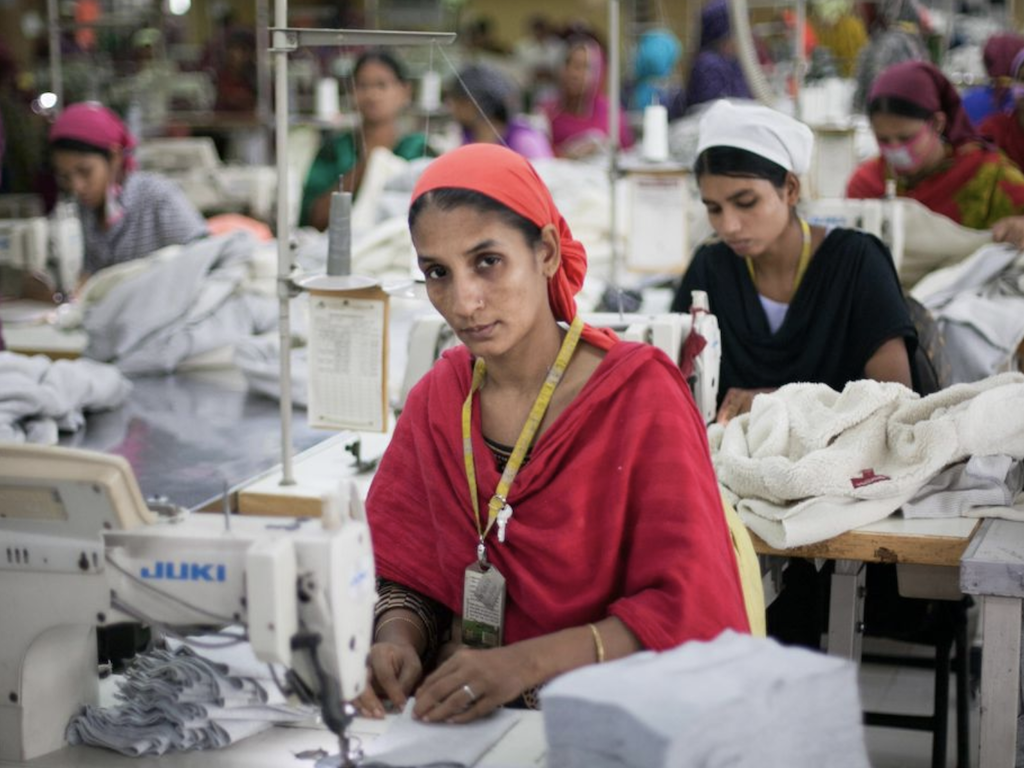M&S, Walmart, Mothercare: Brands Called Out By XR Activists For Not Paying Bangladeshi Workers During Pandemic
3 Mins Read
XR Fashion Action, a global climate advocacy group calling for a 52-week boycott of new clothing or textile products for the planet, has recently voiced the social injustices that garment workers are now facing from fast fashion giants during the coronavirus pandemic. In their Instagram post, the group highlighted the “humanitarian crisis” that is now unfolding in the industry that has long been laden with environmental and workers rights issues, and named the brands that have cancelled or held orders without payment to already vulnerable groups working in the exploitative garment sector located primarily in Bangladesh and across Southeast Asia.
In an impassioned Instagram post, XR Fashion Action is calling on a number of fashion giants to pay their supply chain workers amidst cancelled orders due to the coronavirus pandemic. The group referenced a recent Forbes article that revealed the human cost of a number of brands that are now refusing to pay for their cancelled or held-back orders due to a nosedive in demand as daily life comes to a standstill across the world. Many of these orders are already completed or are in production.
“A humanitarian crisis is unfolding in Bangladesh, with the fate of 4.1 million garment workers in the hands of western fashion brands, who have reportedly cancelled over US$2.8 trillion in orders as the Covid-19 crisis escalates,” XR Fashion Action wrote.
While public outcry about the injustices faced by already low-income and vulnerable workers that work in exploitative conditions has led to some brands agreeing to pay, the group said that a number of the “biggest players on high streets around the world continue to hold out, leaving over a million workers without income or severance pay”.
Some of these brands include Primark, C&A, Mothercare, Bestseller, Tesco’s F&F Clothing, Marks & Spencer, Kohl’s, Walmart, LLP and JC Penney. Among these, the worst offenders are Primark and C&A, who have cancelled or held orders that are already in production or completed without payment in Bangladesh worth US$273 million and US$166 million respectively.
“For workers with no ability to put food on the table, let alone cover medical expenses, and who live on the knife edge of poverty, this is devastating for themselves and their families,” said XR Fashion Action.
So far, the brands that have committed to pay what workers in their supply chain are owed include H&M, Inditex (the owner of Zara, Massimo Dutti, Pull & Bear and Bershka among others), Kiabi, PVH, Target and the North Face and VANS-owning group VF Corp.
Some smaller independent brands are doing their part too. Ethical custom apparel brand To The Market, for instance, recently made the point to not cancel any orders it has already placed in order to avoid the devastating impacts for the livelihoods of workers down its supply chain. A number of eco-brands have followed these footsteps, including zero-waste brand Tonlé and ethical shopping platform Wearwell.
The news of the failure of big brands to pay its supply chain workers will no doubt further taint the fashion industry, which has been reeling from increased scrutiny over its massive environmental footprint, from generating 10% of global carbon emissions to the 92 million tonnes of waste ending up in landfills each year.
In response, eco-conscious consumers across the world are retaliating by looking for alternative sustainable options and boycotting brands that are considered damaging to the planet. Fashion giants that have held onto its consumer base have done so by introducing more eco-friendly practices, though many are still battling criticisms of greenwashing.
Workers in the textile industry typically live in cramped conditions with little access to basic sanitation or the ability to isolate – and now without incomes, they are facing abject poverty alongside the threat of a deadly disease. As the coronavirus pandemic continues to linger, it is vital that we do our bit to demand justice for garment workers in Asia from western fashion brands.
Read our previous news coverage of Covid-19 here.
Correction: This article was updated to reflect that VF does not own Nike. We regret the error.
Lead image courtesy of Nurphoto via Getty Images.




